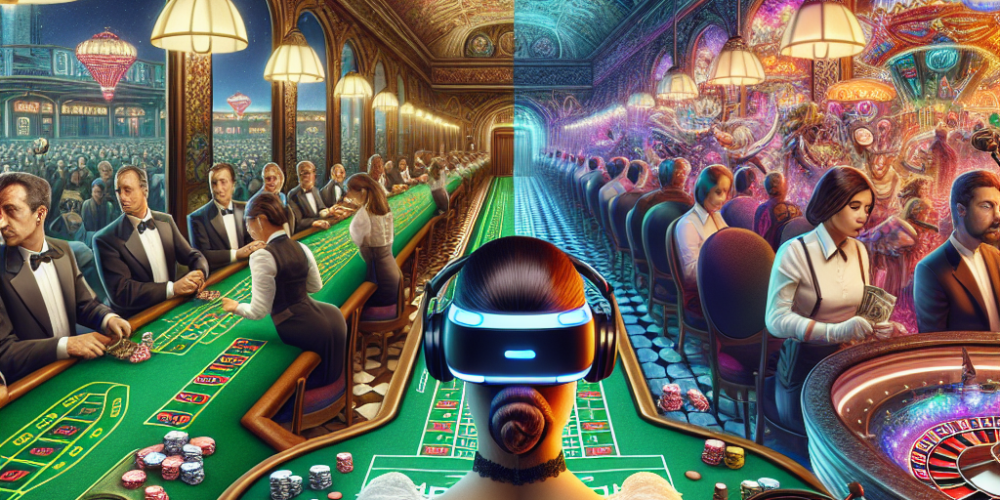The gaming industry is witnessing a revolutionary change with the integration of Virtual Reality (VR) technology, particularly within the realm of casino gaming. This immersive tech is transforming the traditional casino experience, transferring the thrill of Las Vegas-style gambling into the virtual world. Through VR, players can engage in a 360-degree gaming environment, interact with other players in real-time, and experience the excitement of casino games without leaving their homes.
Virtual reality in casino gaming isn’t a completely new concept, but its development and adoption have significantly accelerated thanks to advancements in VR hardware and software. The increase in accessibility of VR headsets like the Oculus Rift, HTC Vive, and PlayStation VR has opened new possibilities not just for hardcore gamers but also for casual players and gamblers seeking novel experiences.
Growth and Potential of VR Casinos
Market analysts have observed a steady growth in the VR segment of the gaming industry. A report by Grand View Research, Inc. projected that the global VR market would reach USD 62.1 billion by 2027, growing at a compound annual growth rate (CAGR) of 21.6% from 2020 to 2027. Casinos are tapping into this growth by offering virtual reality casino games that mimic their physical counterparts with great detail and realism.
Players can stroll along virtual casino floors, interact with slot machines, and hit the roulette tables just like they would in a physical casino. Games like PokerStars VR have set a precedent, offering not only gambling but also social interactions, thus enhancing user engagement. This element of social gaming coupled with traditional gambling helps VR casinos attract a broader audience, spanning avid gamers and seasoned gamblers alike.
Technological Enhancements and User Experience
What sets VR casinos apart from online gambling websites and traditional gaming formats is the depth of immersive and interactive experience offered. The VR casinos are designed to deliver sensory details: the clinking of chips, the spin of the slot machines, and the shuffle of cards. This meticulous attention to sensory details requires constant technological enhancements.
Moreover, the realism in these virtual environments is enhanced by the use of AI to simulate customer service agents and other players, thereby enriching the interactive aspect of the games. Future advancements are expected to introduce more refined gestures and movements, improving user interaction and the overall gaming experience.
Challenges Faced by VR Casinos
Despite the promising growth and the allure of VR casinos, there are several challenges they must overcome. One significant hurdle is the cost and accessibility of VR technology. High-quality VR headsets are still relatively expensive for the average consumer, which could limit market reach. Additionally, there are concerns about the regulatory and ethical dimensions of gambling within a virtual realm, which could influence public acceptance and legal frameworks.
Moreover, developers must continuously work on solving issues related to motion sickness and user fatigue, common problems associated with prolonged VR use. Ensuring games are comfortable and accessible will be key to maintaining the growth of VR casinos.
The Future of VR Casino Gaming
Looking forward, the potential of VR casino gaming is vast. Innovations like blockchain technology could further transform this niche by enhancing security and transparency in gambling transactions. Moreover, as VR technology becomes more mainstream and cost-effective, it could become a standard extension of physical casinos, offering a hybrid model where players can seamlessly switch between real-world and virtual casinos.
As VR casinos become more sophisticated and prevalent, they are likely to play a significant role in the future of both the gaming and gambling industries. The immersive nature of VR has the potential to attract a new generation of gamers who seek experiences that are not only entertaining but also incredibly realistic and socially engaging. The continual evolution of VR technology promises to keep this segment vibrant and increasingly popular among digital natives.
In conclusion, as the lines between physical and virtual continue their convergence, VR casinos are well-positioned to become a significant player in the world of casino gaming, offering a blend of tradition and cutting-edge technology to enhance the gambling experience. As we look to the future, the integration of further technological advancements will undoubtedly unlock new dimensions of gaming, making virtual reality casinos a mainstay in the gaming industry landscape.

Karine Gomez is an enthusiastic writer and avid gamer with a particular love for PlayStation and casino gaming. Her deep knowledge of gaming trends and casino dynamics makes her articles both informative and engaging. Karine’s passion for PlayStation games and her firsthand experience with casino play shine through in her writing, offering readers authentic insights and valuable tips.

